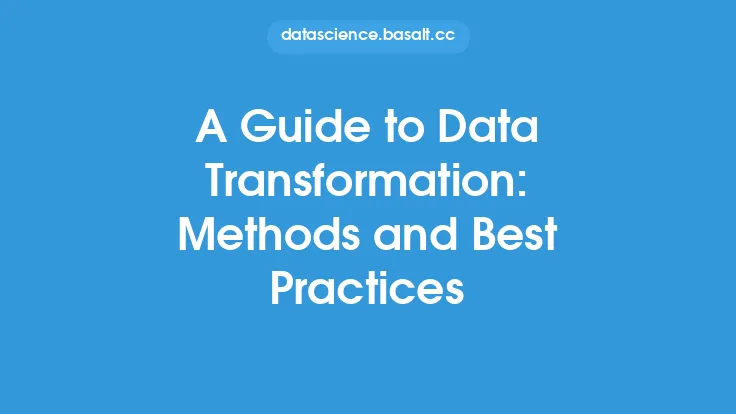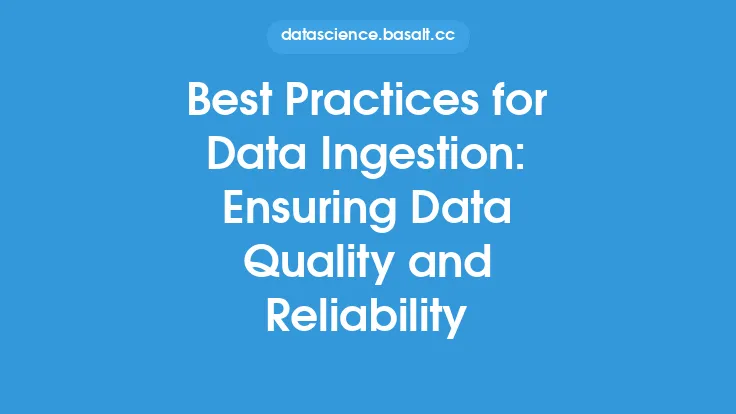Big data engineering is a field that deals with the design, development, and maintenance of large-scale data systems. It involves a range of activities, from data ingestion and processing to storage and analytics, with the goal of extracting insights and value from large datasets. At its core, big data engineering is about building scalable, efficient, and reliable systems that can handle the complexities of big data.
Introduction to Big Data Engineering
Big data engineering is a multidisciplinary field that combines concepts from computer science, software engineering, and data science. It requires a deep understanding of data structures, algorithms, and software systems, as well as expertise in areas like distributed computing, parallel processing, and data storage. Big data engineers work with a range of technologies, including Hadoop, Spark, NoSQL databases, and cloud-based platforms, to design and implement big data systems that meet the needs of organizations.
Key Concepts in Big Data Engineering
There are several key concepts that are fundamental to big data engineering. These include:
- Data ingestion: The process of collecting and transporting data from various sources into a big data system.
- Data processing: The process of transforming, aggregating, and analyzing data to extract insights and value.
- Data storage: The process of storing and managing large datasets in a scalable and efficient manner.
- Data analytics: The process of applying statistical and machine learning techniques to extract insights and patterns from big data.
- Scalability: The ability of a big data system to handle increasing amounts of data and user traffic without compromising performance.
- Performance: The ability of a big data system to process and analyze data quickly and efficiently.
Big Data Engineering Technologies
Big data engineering involves a range of technologies, including:
- Hadoop: An open-source framework for distributed computing and data processing.
- Spark: An open-source framework for in-memory data processing and analytics.
- NoSQL databases: A class of databases designed to handle large amounts of unstructured and semi-structured data.
- Cloud-based platforms: Platforms like Amazon Web Services, Microsoft Azure, and Google Cloud Platform that provide scalable and on-demand computing resources.
- Data warehousing: A process of storing and managing data in a centralized repository for analytics and reporting.
Best Practices in Big Data Engineering
There are several best practices that big data engineers should follow to ensure the success of their projects. These include:
- Design for scalability: Big data systems should be designed to handle increasing amounts of data and user traffic.
- Use distributed computing: Distributed computing frameworks like Hadoop and Spark can help to process large datasets quickly and efficiently.
- Optimize data storage: Data storage systems should be optimized for performance, scalability, and cost-effectiveness.
- Use data governance: Data governance frameworks can help to ensure data quality, security, and compliance.
- Monitor and maintain: Big data systems should be continuously monitored and maintained to ensure performance, scalability, and reliability.
Data Processing and Analytics
Data processing and analytics are critical components of big data engineering. There are several techniques and technologies that can be used to process and analyze big data, including:
- Batch processing: A technique for processing large datasets in batches.
- Stream processing: A technique for processing data in real-time as it is generated.
- Machine learning: A class of algorithms that can be used to extract insights and patterns from big data.
- Deep learning: A class of algorithms that can be used to extract insights and patterns from complex datasets.
- Data visualization: A technique for presenting data in a graphical or visual format to facilitate understanding and insights.
Data Storage and Management
Data storage and management are critical components of big data engineering. There are several technologies and techniques that can be used to store and manage big data, including:
- Distributed file systems: A class of file systems that can be used to store and manage large datasets across multiple nodes.
- NoSQL databases: A class of databases that can be used to store and manage large amounts of unstructured and semi-structured data.
- Data warehousing: A process of storing and managing data in a centralized repository for analytics and reporting.
- Data lakes: A repository of raw, unprocessed data that can be used for analytics and reporting.
- Data governance: A framework for ensuring data quality, security, and compliance.
Security and Compliance
Security and compliance are critical components of big data engineering. There are several techniques and technologies that can be used to ensure the security and compliance of big data systems, including:
- Data encryption: A technique for protecting data from unauthorized access.
- Access control: A technique for controlling access to data and systems.
- Authentication: A technique for verifying the identity of users and systems.
- Compliance frameworks: A framework for ensuring compliance with regulatory requirements and industry standards.
- Audit and logging: A technique for tracking and monitoring system activity to ensure security and compliance.
Conclusion
Big data engineering is a complex and multidisciplinary field that requires a deep understanding of data structures, algorithms, and software systems. By following best practices and using the right technologies and techniques, big data engineers can design and implement scalable, efficient, and reliable systems that extract insights and value from large datasets. Whether you are working on a small-scale project or a large-scale enterprise system, the principles and concepts outlined in this article can help you to succeed in the field of big data engineering.





